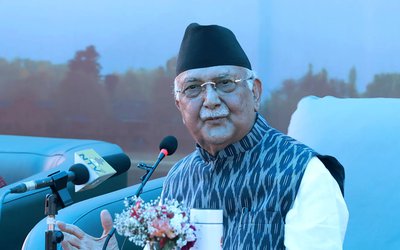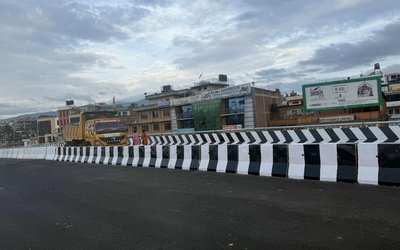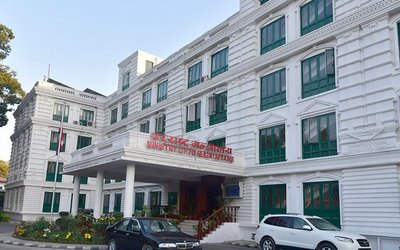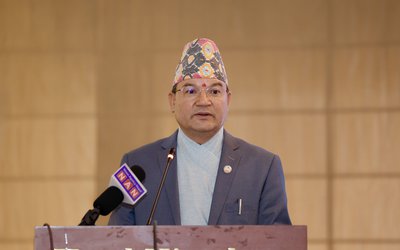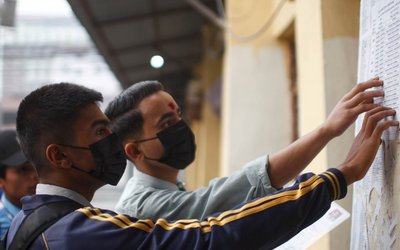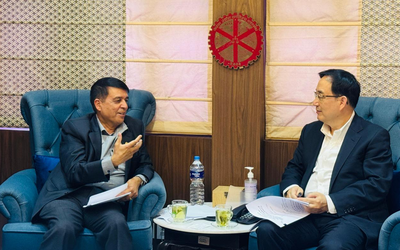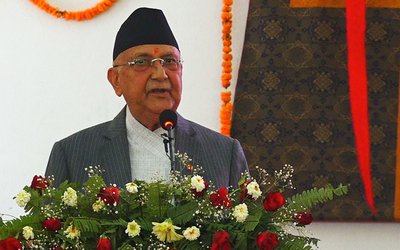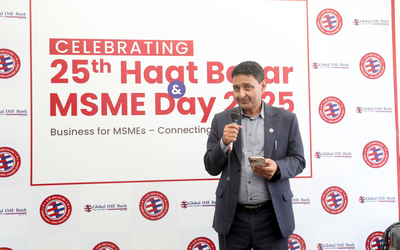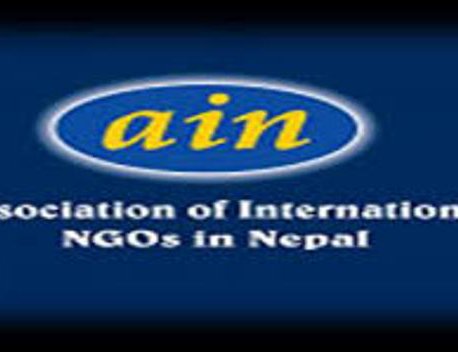
Association of International NGOs in Nepal (AIN) welcomes the latest decision of Government of Nepal (GoN) to allow INGOs to deviate up to 20 per cent of existing project budgets to combat coronavirus pandemic crisis facing the nation. AIN appreciates the guarantee by Social Welfare Council (SWC) for fast track process in approval of new projects for COVID-19 Preparedness and Response. Many INGOs have implemented some COVID-19 response projects and many others are at the final stage to implement, some are at stage of waiting donors' approval. AIN is committed to function in a coordinated manner with the line ministries, SWC and local governments in order to support COVID-19 Preparedness and Response.
“Based on the latest survey conducted by AIN secretariat, we would like to share the following details on INGOs members’ active contribution in COVID-19 Preparedness and Response,” said a press release issued by AIN.
Member INGOs have supported in: establishing temporary hand washing stations and materials required for establishing isolation and quarantine centers as per the request from the local governments; materials provision for quarantine centers; installation of contactless and feet operated hand-washing stations in many locations across Kathmandu Valley and Siraha District. Until now, at least 2,000 Personal Protective Equipment (PPE) sets have been handed over to the health facilities, local, provincial government units; along with over 2,000 N-95 masks, over 95,000 surgical masks and thousands of shoe covers, aprons and gloves. In addition, a joint procurement effort by 15 AIN members undertook purchased hygiene and medical supplies (including more than 4,500 PPE sets). Additional 2,300 PPE sets are ready to be distributed this week. The value of this joint procurement plus ready-to-distribute PPE sets is worth above NPR 65 million.
To support health service facilities, key health service equipment like ventilators, quarantine beds, mattresses, cardiac monitors, electric suction machines, ECG machines, have been dispatched across the country. Member organizations have also supported hygiene materials to meet the needs of thousands of vulnerable households that include soaps, hand sanitizers, face masks and buckets. Similarly, some of the organizations have also provided support to Provincial Public Health Laboratory (PPHL) to conduct sample collection and use of PPE orientation to health and laboratory staffs. Members are supporting essential daily workers such as sanitation workers keeping in mind, their health, safety and dignity. Personal Protective Kits (basic PPE) were provided to hundreds of sanitation workers in Kathmandu, Kirtipur and Lalitpur Districts, including hospitals. Canopies have been made available to the local government units for temporary health desk establishment.
Most AIN members started awareness and orientation campaigns since mid-March using channels such as community radios, social media, milking and other platforms, all in line with National Health Education Information Communication Center (NHEICC) under the Ministry of Health and Population (MoHP). Public Service Announcements (PSAs) in Nepali and local languages were aired through above 300 community radios across the country reaching above 16.5 million people across all 7 provinces. Airing radio jingles; awareness messaging through radios, national and local televisions, and social media; mobile awareness campaigns, among others targeting entire country are being carried out. Many visual awareness messages designed in sign languages are also being disseminated. Approximately, 60,000 pamphlets and 11,500 fliers have been distributed to local authorities in Province 2, 5 and 7. SMSs were sent to 618,000 households with aim to dispel rumors and provide accurate information. Specific messaging through tele-counselling were introduced targeting households with migrant workers who have recently returned home; and households with symptoms of COVID-19, reaching approximately 10,000 households.
Community health mobilizes have been oriented and deployed in order to support the local government at health desks for fever checking, information dissemination and record keeping of migrants returning to the villages from India and other countries. This intervention is focused mostly on the bordering areas where the influx of immigrants working in India is very high.
COVID-19 information helps desks have been established across the rural and municipal level in covering many parts of the country; whereas establishment of many are underway. These help desks are providing essential hygiene materials required for hand washing and sanitization; and conducting hygiene promotion as part of COVID-19 preparedness.
As part of immediate relief, following the government guideline, food packages have been delivered to thousands of the vulnerable and worst affected households. Food assistance delivery to the local quarantine centers and isolation centers is underway.
AIN has deep concern over COVID-19's impact on child right and realizes that the children, particularly belonging to the most vulnerable and deprived households, children without parental care and especially those in institutions, are currently and will be impacted for months and years to come by this crisis. AIN members who have thematic expertise in education and child protection are coming up with particular actions focusing children, including children with disabilities. Information, Education and Communication (IEC) materials and pamphlets have also been distributed in coordination with local governments.
The lockdown provision does not come in an exception for me /NGO members and staffs. Yet some AIN members have secured special permit to deliver immediate relief supplies to the targeted local government partners. AIN continues to advocate for mobility supports to its members and partners to speed up COVID-19 response. In the meantime, internally, AIN also advocates for all INGOs members implementing response to respect social distancing measures as well as to ensure all response activities implemented in ways that minimize risks to communities or local government partners, as well as I/NGOs staff themselves.
- SEE 2025 Results: 61.81 percent students secure grades
- Jun 28, 2025
- FNCCI President Dhakal Urges China for Cooperation in Technology and Innovation
- Jun 28, 2025
- Prime Minister Oli to Address House of Representatives Today, Will Brief on Spain Visit
- Jun 28, 2025
- Global IME Bank Grandly Celebrated International Micro, Small, and Medium Enterprises (MSME) Day and the 25th Week of Global Haat Bazaar
- Jun 28, 2025
- Weather Forecast: Partly To Generally Cloudy With Moderate Rainfall At Some Places of Hilly Region Of The Country
- Jun 28, 2025

